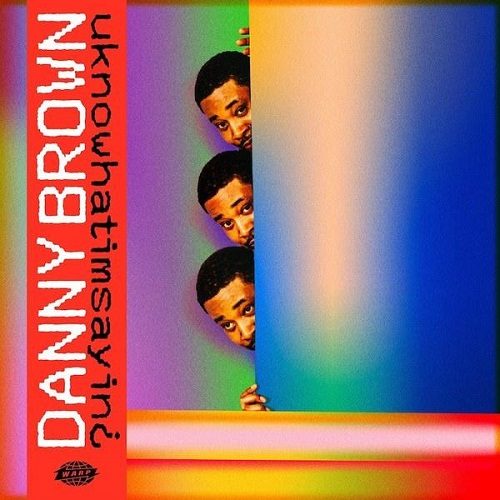As a guest on Kenny Beats’ phenomenal YouTube series “The Cave,” Danny Brown made it clear that he’s not with the “jumping around s–t” anymore. In other words, he’s moved on from the coked-out electro-rap that dominated his earlier projects (“Old” comes to mind for me). His days of partying and hard drug use are over. Instead, Brown is comfortable in his role as hip hop classicist on his newest album “unknowhatimsayin¿”
The sharp change in tone and image is somewhat surprising. Not too long ago (six years to be exact), Brown was rapping about his sometimes disturbing sexual fantasies on songs like “Dope Fiend Rental” and “Dubstep.” His free-flowing yelps and hypnotic rhyme schemes coincided perfectly with his sideways haircut and gap tooth. In 2013, Brown’s off-kilter personality made him the poster boy for hipster rap. In the midst of trap music’s ascension, Brown was mixing EDM with 808s for insane concotions.
Fast forward to 2019 – Brown is now a clean-shaven 38-year-old who looks like someone’s father; rather than a past drug dealer. The maturity is evident on “uknowhatimsayin¿;” Brown’s first record since the notably bleak and unpredictable “Atrocity Exhibition” from 2016. With help from the legendary Q-Tip – who executively produces this album – Brown rarely refrains from using his infectious personality as a channel for entertaining street rap.
“Dirty Laundry” for example finds the rapper telling a fascinating (and very, very funny) story about his past escapades with a stripper; and how it all ended with an encounter at the laundromat. Q-Tip provides this carnival-like beat filled with chopped-up percussion and spaced-out boom bap. The production is flamboyant enough for Brown’s fluctuating tempo and wildly entertaining lyrics. It’s a formula he’s perfected over the years.
“Ever seen a roach have babies on babies?
In the hood like whatever, we in this b**** together
Once got a h*, ain’t got money for the room
So we did the Humpty Hump in the Burger King bathroom”
The above lyrics reflect Brown’s sentiment about this being his version of a stand-up comedy album. Even without a catchy chorus, the dynamic wordsmith relishes in his absurdity, making for a memorable listen regardless of the structure. As Brown exclaims on the intro track; “Ain’t no pretend, ain’t tryna make amends/Just tryna keep my legacy, I’m a legend in the end.” These moments of braggadocio turn up frequently throughout, acting as a blunt reminder of Brown’s understated impact.
Brown shows an innate ability to make stark transitions from ego-driven machismo to insecure vulnerabilities. Sometimes, these mood swings are illustrated in one song. After listing the reasons why he’s a legend, Brown uses the refrain on “Change Up” as a venue for self-evaluation.
“Up all night, toss and turn when I sleep
Pacing around, drowning sorrows in my drink
Can’t even think, got my mind wrapped up
But I still bite down, clench my teeth, knuckle up”
An occasional bar representing Brown’s past tribulations is normally backed by blunt vulgarities. He compares a woman’s private parts to a Kit-Kat on “Theme Song;” pisses in the same sink you wash dishes with on “Belly of the Beast;” and ignores a girl’s email as if she were LinkedIn on “Savage Nomad.”
When he’s not acting crass, Brown spits metaphorical one-liners like there’s no tomorrow. “Best Life” thoroughly encapsulates all of his best attributes as a technical lyricist. Q-Tip’s soulful production is a nice change of pace for an artist known for teetering off the edge of insanity. In “The Cave” episode, Brown says that he always needs to write down lyrics in his phone. A song like “Best Life” confirms this proclamation as genuine. He’s a meticulous artist who somehow never overthinks anything. The poignant bars about street life represent that.
Brown also gains help from fellow experimentalist JPEG Mafia; as well as hip hop traditionalists Run the Jewels and Consequence. Killer Mike and El-P are especially on their A-game, rapping about politics and drugs in the same exuberant tone as Brown. Mike spits from an intellectual standpoint, adding much-needed oomph to his socially conscious content matter. His frustrations with our country compliment Brown’s poignant one-liners well.
Flying Lotus, Devonte Hynes, and frequent collaborator Paul White also carry production credits. The wide range of styles and aesthetics make for a fruitful listen, even if most of the subject matter fails to follow a tighter narrative. Thundercat and Flying Lotus add some funk-inspired percussion for a breezier experience on “Negro Spiritual.” Brown still brings a gruff melody to the track, capitalized by a swift JPEG chorus about people being fake tough. It’s a song that shouldn’t work, but somehow does. Which, in a nutshell, sums up Brown’s unorthodox career.
Even at its most mundane (like on the painfully repetitive title track), “uknowhatimsayin¿” represents an artist at his most polished and enthusiastic. His idea of fun has evolved from woozy club theatrics to chilled-out studio sessions with a blunt in his mouth. His appreciation for 90s hip hop is clearly exuded through the grainy horn section on “Combat,” and the pinpoint rhythm sections on “Shine.” A lot of this is courtesy of Q-Tip’s finite tinkering. A lot of it is just Danny being Danny.

